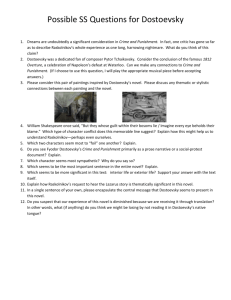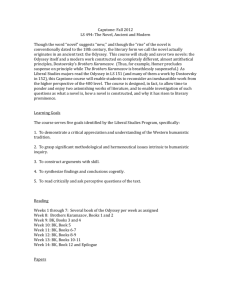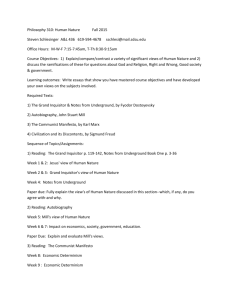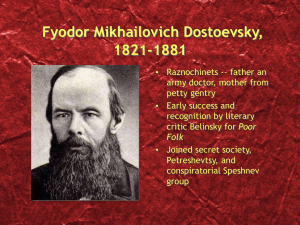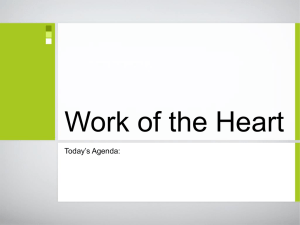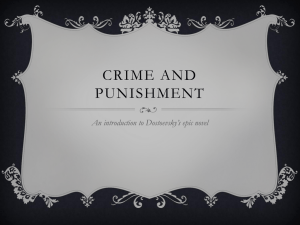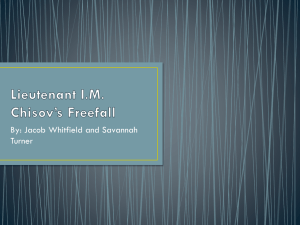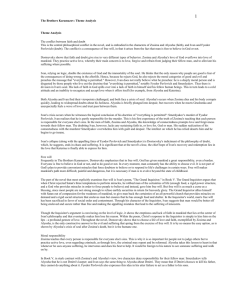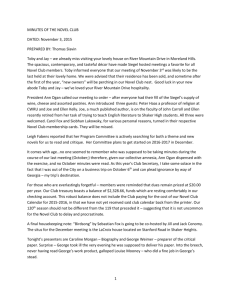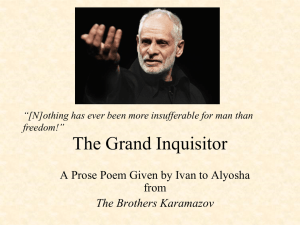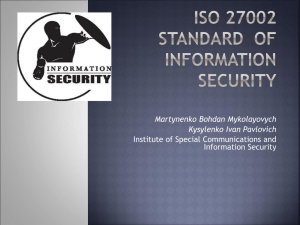The Brothers Karamazov
advertisement
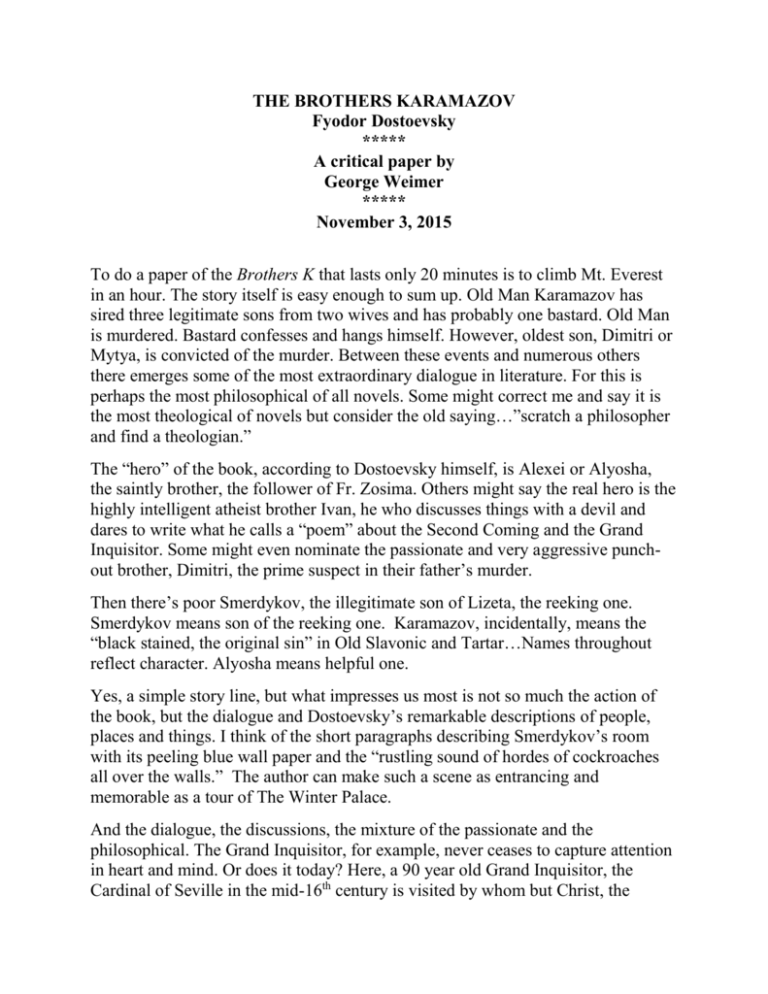
THE BROTHERS KARAMAZOV Fyodor Dostoevsky ***** A critical paper by George Weimer ***** November 3, 2015 To do a paper of the Brothers K that lasts only 20 minutes is to climb Mt. Everest in an hour. The story itself is easy enough to sum up. Old Man Karamazov has sired three legitimate sons from two wives and has probably one bastard. Old Man is murdered. Bastard confesses and hangs himself. However, oldest son, Dimitri or Mytya, is convicted of the murder. Between these events and numerous others there emerges some of the most extraordinary dialogue in literature. For this is perhaps the most philosophical of all novels. Some might correct me and say it is the most theological of novels but consider the old saying…”scratch a philosopher and find a theologian.” The “hero” of the book, according to Dostoevsky himself, is Alexei or Alyosha, the saintly brother, the follower of Fr. Zosima. Others might say the real hero is the highly intelligent atheist brother Ivan, he who discusses things with a devil and dares to write what he calls a “poem” about the Second Coming and the Grand Inquisitor. Some might even nominate the passionate and very aggressive punchout brother, Dimitri, the prime suspect in their father’s murder. Then there’s poor Smerdykov, the illegitimate son of Lizeta, the reeking one. Smerdykov means son of the reeking one. Karamazov, incidentally, means the “black stained, the original sin” in Old Slavonic and Tartar…Names throughout reflect character. Alyosha means helpful one. Yes, a simple story line, but what impresses us most is not so much the action of the book, but the dialogue and Dostoevsky’s remarkable descriptions of people, places and things. I think of the short paragraphs describing Smerdykov’s room with its peeling blue wall paper and the “rustling sound of hordes of cockroaches all over the walls.” The author can make such a scene as entrancing and memorable as a tour of The Winter Palace. And the dialogue, the discussions, the mixture of the passionate and the philosophical. The Grand Inquisitor, for example, never ceases to capture attention in heart and mind. Or does it today? Here, a 90 year old Grand Inquisitor, the Cardinal of Seville in the mid-16th century is visited by whom but Christ, the Second Coming who has just raised a young girl from the dead on the cathedral steps. His only words, in Aramaic, are “Talitha cumi”…damsel arise. And she does. Those are his only words in this “poem” by Ivan, never written down, just recited by Ivan to Alexei, Alyosha. Often read as a separate work, the words of the Grand Inquisitor sum up one of the main themes and challenges in the novel. Does God exist? Does He, if He does, care for us? How can there be a caring God with so much human suffering throughout the Ages? Is the “burden” Christ left humanity with, namely freedom of choice and total charity towards others, too much for all but a few to bear? Is the church, here the Roman Catholic Church, correct to “correct” Jesus by offering abundant forgiveness and heaven for all who follow a ritualistic set up administered by atheists like the Cardinal of Seville? The drama of Ivan’s “poem” is totally disturbing to Alyosha as well as most readers in 1880. Is it still now? As an aside, does the Grand Inquisitor’s analysis of the suggestions of Jesus reflect the words of Jesus in the New Testament? I think not. This is Ivan’s poem. Ivan, as an atheist also, says, like Dostoevsky, when discussing atheism, “everything is permitted.” Famously there is the author’s question: Can there be morality without God? And the author’s answer: No. The Grand Inquisitor dismisses Jesus and says with great anger to him: Never come back! The poem says the Grand Inquisitor is an atheist but loves humanity. Odd, isn’t it, when everything is permitted? On with the story. Both father and son Dmitri are smitten by the same woman, Grushenka. She is, in effect, the catalyst for Dmitri’s long-living hatred of his father – a hatred that has been building up for years. He actually tells her he could kill old Fyodor, which is the author’s own name as well. Meanwhile, in a series of three meetings, Smerdykov convinces Ivan that he is complicit in some mystical way in wanting and arranging for his father’s death. Interestingly, in one of the most dramatic outbursts at the trial of Dimitri, Ivan testifies, screams out really, that “Everyone wants to kill his own father … everyone!” Freud was a great admirer of this book and one can see why, but it was not just the obvious Oedipal complexes in several characters, but the fact that Freud, who analyzed himself, felt that Dostoevsky’s novel was also his self-analysis. Many critics have come to agree and see this book as Dostoevsky’s personal psychoanalysis. Indeed, the characters and events in the book are often autobiographical in terms of his own personal journey from atheism through gambling and rebellion to devout Russian Orthodox Christianity mirror the personalities of all three legitimate brothers and the tortuous life and smoldering hatred of Smerdyokov’s unjustly wretched life. He is a cook and servant to his own father. One cannot help but recall and re-shout Edmund’s command to God himself…now let God stand up for bastards! The famous story of Dostoevsky’s reprieve after the horseman’s sword is flashed over his head must be noted in his transformation from one end of the political and religious spectrum to the other. One can understand the overall novel from that point of view, as a psychoanalytic journey through the mind and heart of Dostoevsky, and every man, as he grew and developed from a wide and wild-eyed youth to a sage friend of God. However the novel is also a terrific story, full of drama and moving scenes. It is, in effect, also a cigar. Mention must be made of the extraordinary and numerous literary and historical allusions in the text. This is a Russian book, written in one of the most proverbial of languages. If there is one criticism I have of this translation, which has been praised by numerous critics, it’s the fact that their footnotes drive you nuts. Why in the back of the book? Also the jacket…a irritating piece of an inappropriate painting of LaTour. So much better it could be. Everywhere in the text and everywhere in the action, the dynamic and the tension is the same: what is the point of existence? Why am I bothering with these fights? These wars, these cares and concerns? Like Jacob wrestling with some mysterious spirit, like martyrs everywhere, like all true believers, from Jesus to Martin Buber, who is this I that Thou has summoned? This huge novel is a book in parts, like other 19th century novels – say of Thackeray and Dickens. It came out in a series in a Russian Gazette. Therefore, it is episodic, even like a soap opera. There are two or three movies of the Brothers K. One has L. J. Cobb as Old Man Karamazov and William Shattner as Ivan…Captain Kirk confronts the devil. I have read this book twice now and certain “parts” stand out more than others in the mind and memory. Dmitri’s cruel treatment of Nikolai Ilyich Snegiryov as he pulls him, humiliating him, by the beard. This scene is re-visited at the funeral of Captain Snegiryov’s son, the much loved Ilyusha. The embarrassing scene with the Karamazovs and Fr. Zosima at the monastery. Then there is the death of Fr. Zosima with Ayosha arriving just in time to say fare well…and the great disappointment of Fr. Zosima’s followers when awful odors quickly arose from his body after death. He was considered a saint and saints’ bodies don’t do that. The pathetic and moving ending of Snegiryov’s son Ilyusha. His body in the coffin does not offer a repulsive odor…for he is innocence. If there’s a candidate for most moving and tearful scene in the book it is the funeral of the captain’s son. I confess I was moved to tears at my second reading of the last part of the book. “Let us never forget these feelings. This love we have for one another and for that dear boy Ilyusha,” says Alyosha, or Karamazov as the boys call him. He refers to the boys as “gentlemen,” and notes that “if any of us becomes wicked, let him never laugh at the kindness and love we feel now.” The captain’s gift of the flowers, finally, after his refusal to offer even one to his wife, Mama, from the boy’s coffin is almost too much to bear. Overly sentimental? Melodramatic? Smalz even? Yes, but powerful. The trial is as dramatic as it gets in courtroom scenes. And again, of course, Ivan’s “poem”, the Grand Inquisitor, a kind of sadistic atheist’s fantasy is impossible to forget. And the last scene again with the children being instructed, saved as it were by Alyosha. I couldn’t help thinking of Holden Caulfield in Catcher in the Rye…saving the children by intercepting them as they roamed near a cliff. Every character in the novel is wrestling with his own lesser angels, all the men, all the women and even the children – where Dostoevsky ends his great work – are in a war with their own lesser angels. On one level, only as a story, but always underneath, there is this tension. Near the end, after the fascinating double essays of the defense attorney, Fetukovich, the famous lawyer from St. Petersburg, and prosecuting attorney Ippolit Kirillovich, which reminded me of the great arguments between Naphta and Settembrimi in The Magic Mountain of Thomas Man, there is this theme of justice in the face of the inadequacy of our species. The audience in the court room (all Russia was transfixed by the trial), as if it were us, the readers, not only knows Mitya is innocent of this particular crime, but we also agree with the brilliant arguments of the defense. Yet, the jury, uneducated, unsophisticated and perhaps vengeance-led, says guilty! It’s a peasants’ playground. Perhaps one of you can help me here. All the evidence against Dimitri is circumstantial. However, I thought I read that Smerdykov left a note and Grushenka found it. Could not find such a passage again. Do any of you recall such? If there is an overriding theme in this book, it is internal personal war, the human condition, the one we all wage all the time, even if we are not always aware of the battles, the one announced in so many ways in the book…from its first paragraph, “here is the monster, the evil one, the source of our need for vengeance”…do you leave it up to God…”Vengeance is mine,” saith the Lord…or do you take up arms..? I gather Dostoevsky seems to have planned a sequel…Mytya and Grushenka in New York? Or Cleveland? Finally, I recall the Pushkin speech Dostoevsky gave in St. Petersburg perhaps shortly after The Brothers Karamazov was published and very shortly before his death…people read fast in those days…The huge crowd that had gathered in 1880 knew and loved his books and his fascinating life and his great patriotic love of Orthodox Russia…after his speech… shouted out by the thousands …”Genius! Prophet! Saint!” In that order. Does he seem that way today?
